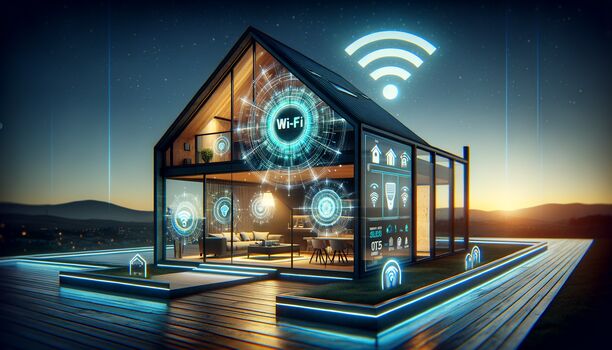


Letztes Update: 22. Februar 2024
The article explores the necessity of Wi-Fi in smart homes, highlighting its role in device connectivity, remote access, and overall functionality. While some devices can work without Wi-Fi, having it enhances the smart home experience by enabling full feature access and seamless integration.
Have you ever pondered the question, "Do smart homes need Wi-Fi?" It's a common query as more people dive into the world of smart home technology. With the rapid advancement in smart devices, it's natural to wonder about the necessity of Wi-Fi in making a home "smart". Let's delve into this topic to understand the role of Wi-Fi in smart homes.
Firstly, it's essential to recognize that smart homes rely on interconnected devices. These devices, ranging from smart thermostats to security cameras, often require an internet connection to function optimally. This is where Wi-Fi comes into play. Wi-Fi serves as the backbone for communication between these devices and the internet, enabling you to control them remotely via smartphones or voice assistants.
However, the question of "Do smart homes need Wi-Fi?" doesn't have a one-size-fits-all answer. While Wi-Fi is crucial for many smart home devices, some can operate with alternative connections like Bluetooth or Zigbee. These alternatives can control devices locally, but they might lack the ability to offer remote control or access to the full range of features without Wi-Fi.
Moreover, considering the future of smart homes, Wi-Fi's importance cannot be understated. It facilitates seamless integration and scalability. As you add more devices to your smart home ecosystem, having a robust Wi-Fi network ensures that all devices can communicate effectively, providing a cohesive and efficient smart home experience.
In conclusion, while certain smart home devices can function without Wi-Fi, having a Wi-Fi connection unlocks the full potential of smart home technology. It enhances device interoperability, remote access, and the overall convenience that defines a smart home. So, when pondering "Do smart homes need Wi-Fi?", the answer is generally yes if you wish to leverage the full spectrum of smart home capabilities.
Last updated 3 mins ago
Antwort der Redaktion
When considering the transition to a smart home, a common question arises: Do smart homes need Wi-Fi? The short answer is yes, but let's delve deeper into why Wi-Fi plays a crucial role in the functionality of smart homes and explore some alternatives.
Wi-Fi serves as the backbone for most smart home systems. It enables devices to communicate with each other and with the internet. This connectivity allows for the remote control of devices, automation of tasks, and the collection of data for further customization of the smart home experience. Without Wi-Fi, the functionality of these devices would be severely limited.
Wi-Fi's widespread availability and ability to support a large number of devices simultaneously make it ideal for smart homes. It supports the transmission of high volumes of data quickly and reliably, which is essential for devices that rely on real-time information, such as security cameras and smart thermostats.
While Wi-Fi is prevalent in smart homes, it's not the only option. Other technologies like Zigbee, Z-Wave, and Bluetooth can also be used to create a connected home environment. These technologies often require less power and can operate independently of an internet connection, making them suitable for devices that need to conserve energy or function during internet outages.
Despite their benefits, alternatives to Wi-Fi have limitations. They may not support as many devices or the same high-speed data transfer as Wi-Fi. Additionally, setting up a network with these technologies can be more complex, requiring additional hubs or controllers to facilitate communication between devices.
So, do smart homes need Wi-Fi? While not strictly necessary, Wi-Fi significantly enhances the capabilities and convenience of smart homes. It supports a wide range of devices and allows for seamless integration and control. However, for those concerned with energy consumption or network reliability, alternatives like Zigbee and Z-Wave offer viable solutions.
In conclusion, while Wi-Fi is not the only way to connect smart home devices, its benefits make it the preferred choice for most homeowners. As technology evolves, the reliance on Wi-Fi may change, but for now, it remains a cornerstone of smart home functionality.
Last updated 3 mins ago
Exploring the question, "Do smart homes need Wi-Fi?" reveals a fascinating intersection of technology and daily living. In today's world, smart homes offer a level of convenience and efficiency previously unimaginable. But to truly understand the capabilities and requirements of a smart home, it's essential to delve deeper into how these systems operate and interact with our environments.
If you're curious about the broader implications of incorporating technology into your home, you might find "What does a start home do?" particularly enlightening. This page explores the myriad of functions smart homes can perform, from energy management to enhancing security, and how Wi-Fi plays a crucial role in enabling these features.
For those interested in the technical side of setting up a smart home, "Debian or CentOs - Choosing the Right Operating System for Web Server Setup?" offers a deep dive into the foundational aspects of creating a network that supports smart home technology. Understanding the best operating system for your web server setup can significantly impact the performance and reliability of your smart home.
Lastly, as we continue to integrate technology into every aspect of our lives, questions about security become increasingly pertinent. The article "How can I protect my app from reverse engineering and ensure its security?" provides valuable insights into safeguarding the digital components of your smart home against unauthorized access and threats, ensuring that your home remains both smart and secure.
Together, these resources offer a comprehensive look into the world of smart homes, addressing the initial question, "Do smart homes need Wi-Fi?" and expanding the conversation to include the broader implications of living in a connected world.